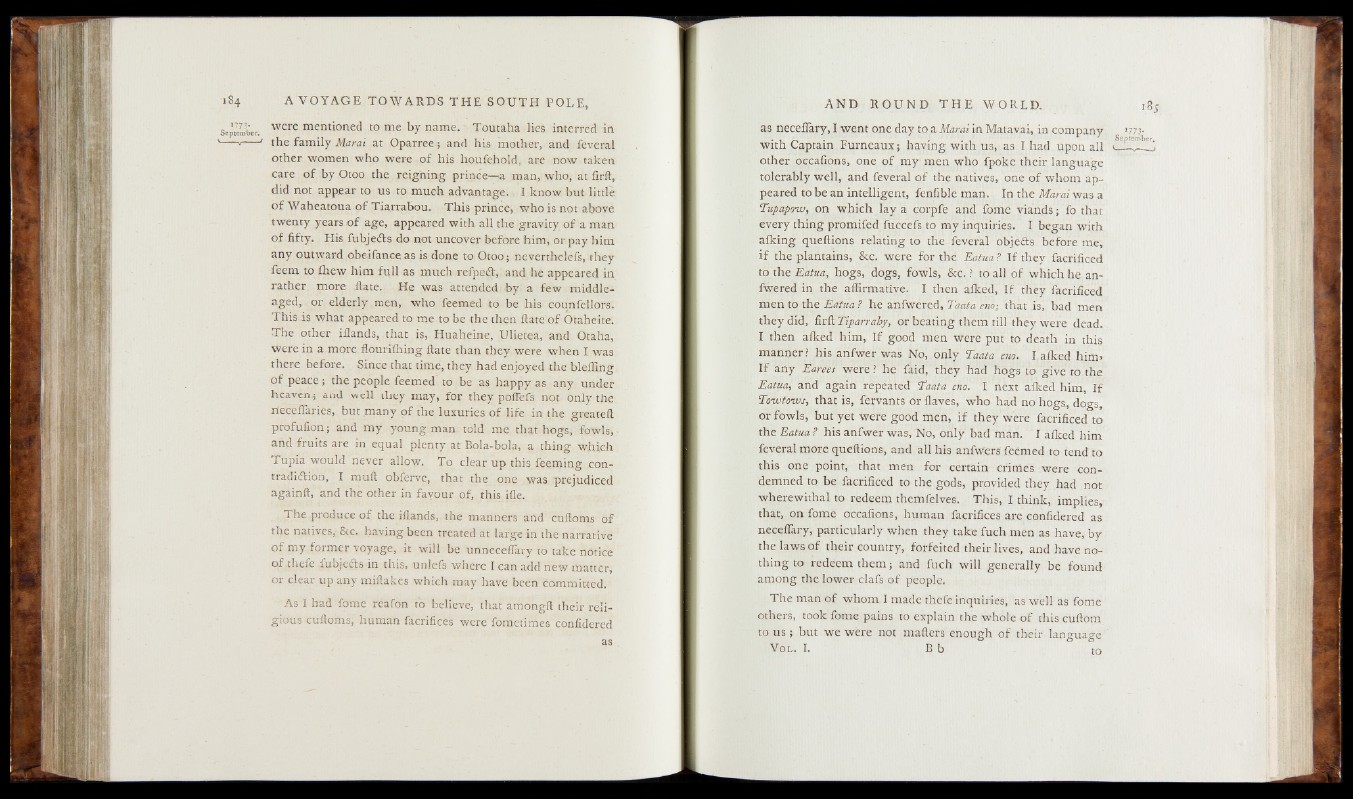
September. wcre mentioned to me by name. - Toutaha lies interred in
'----|>----' the family Marai at Oparree; and his mother, and feveral
other women who were of his houfehold, are now taken
care of by Otoo the reigning prince—a man, who, at firft,
did not appear to us to much advantage. I know but little
of Waheatoua of Tiarrabou. This prince, who is not above
twenty years of age, appeared with all the gravity of a man
of fifty. His fubje&s do not uncover before him, or pay him
any outward obeifance as is done to Otoo; neverthelefs, they
ieem to fhew him full as much refpe£b, and he appeared in
rather more ftate. He was attended by a few middle-
aged, or elderly men, who Teemed to be his counfellors.
This is what appeared to me to be the then ftate of Otaheite.
The other iflands, that is, Huaheine, Ulietea, and Otaha,
were in a more flourifking ftate than they were when I was
there before. Since that time, they had enjoyed the bleffing
of peace; the people feemed to be as happy as any under
heaven.; and well they may, for they poflefs not only the
ifeceftaries, but many of the luxuries of life in the gr^ateft
profufion; and my young man told me that hogs, fowls,
and fruits are in equal plenty at Bola-bola, a thing which
Tupia would never allow. To clear up this feeming contradiction,
I muft obferve, that the one was prejudiced
againft, and the other in favour of, this ifle.
The produce of the iflands, the manners and cuftoms of
the natives, &c. having been treated at large in the narrative
of my former voyage, it will be unneceffary to take notice
of thefe iubjedts in this, unlefs where I can add new matter,
or clear up any miftakes which may have been committed.'
As I had fome reafon to believe, that amongft their religious
cuftoms, human facrifices were fometimes confidered
as
as necefiary, I went one day to a Marai in Matavai, in company
with Captain Furneaux; having with us, as I had upon all
other occafions, one of my men who fpoke their language
tolerably well, and feveral of the natives, one of whom appeared
to be an intelligent, fenfible man. In the Marai was a
Tupapow, on which lay a corpfe and fome viands; fo that
every thing promifed fuccefs to my inquiries. I began with
afking queftions relating to the feveral obje&s before me,
if the plantains, &c. were for the Eatua ? If they facrificed
to the Eatua, hogs, dogs, fowls, &c. ? to all of which he an-
fwered in the affirmative. I then afked, If they facrificed
men to the Eatua ? he anfwered, Taata eno; that is, bad men
they did, firft Tiparrahy, or beating them till they were dead.
I then afked him, If good men were put to death in this
manner? his anfwer was No, only Taata eno. I afked him»
If any Earns were ? he faid, they had hogs to give to the
Eatua, and again repeated Taata eno. I next afked him, If
Tow tows, that is, fervants or flaves, who had no hogs, dogs,
or fowls, but yet were good men, if they were facrificed to
the Eatua ? his anfwer was, No, only bad man. I afked him
feveral more queftions, and all his anfwers feemed to tend to
this one point, that men for certain crimes were condemned
to be facrificed to the gods, provided they had not
wherewithal to redeem themfelves. This, I think, implies,
that, on fome occafions, human facrifices are confidered as
necefiary, particularly when they take fuch men as have, by
the laws of their country, forfeited their lives, and have nothing
to redeem them; and fuch will generally be found
among the lower clafs of people.
The man of whom I made thefe inquiries, as well as fome
others, took fome pains to explain the whole of this cuftom
to us ; but we were not mafters enough of their language
Vol. I. B b to
% l 77 3 -
September.